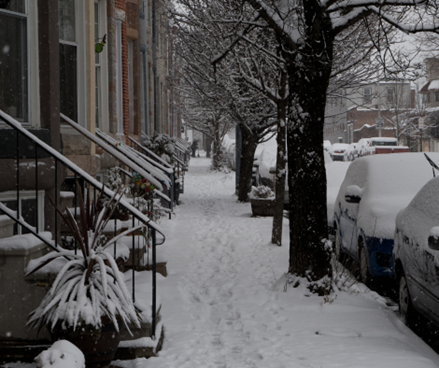As the cold winter weather months are upon us, it is more important than ever that older Americans remain safe and secure in their homes – or are able to find safe and habitable housing. The pandemic demonstrated the devastating impact of homelessness on older people, where being housed or homeless was literally a matter of life and death. Older tenants, especially those on fixed incomes or facing health issues, are particularly vulnerable to housing instability and displacement. They are more likely to be disabled, frail, or in poorer health than younger tenants, and access to safe and affordable housing has an enormous impact on their health, safety, security, and independence.
Philadelphia remains the poorest large city in the nation, with highest percentage of older adults of the 10 largest cities in the nation. With nearly a third of households led by older adults in Philadelphia renting their homes, SeniorLAW Center’s Tenant Rights team works every day to ensure older people’s rights to safe, stable, affordable, and appropriate housing.
We are proud to provide a spectrum of legal services to older adults in a breadth of areas. These include legal information, advice, brief services, extended representation, and systemic, policy and legislative advocacy. Each year, we receive hundreds of calls from tenants in Philadelphia and around Pennsylvania seeking information on their rights and responsibilities as tenants, and on what their landlord must do to comply with the law. We’d like to share some of the questions we receive most often to help guide other tenants along with legal services resources, and hopefully, prevent legal problems and crises from occurring.
1. I moved in three years ago and signed a lease for one year. I’ve been paying my rent every month, but they refuse to give me a new lease. What should I do?
Many leases in Pennsylvania automatically renew if not cancelled in writing by one party. If you moved in with a lease, you are a tenant, and you have rights as a tenant. Some of those rights are under federal law, some under state law, and some are specific to the town or city where you live.
You should review your original lease to see if it renewed automatically. Even if it did not renew, if you have continued to pay rent, you are likely to be a tenant with a month-to-month lease. Don’t panic!
2. I never signed a lease for the place I live, and now the owner wants me to move out. What do I do?
A lease agreement does not need to be in writing to be binding in PA. If you have a verbal agreement and have been paying rent, you are a tenant and have rights. Landlords in PA must give written notice ending a lease, and must go through a court process before they can lock you out of your home. You do not have to move out just because the property owner says so! You may have defenses to an eviction or another way to stay in your home. Talk to an attorney to get advice on your rights.
3. My landlord sent me a letter telling me my lease is over and that I have to move by the end of the month. What do I do?
Just because your landlord asks you to move, does not mean that they can force you out. In our state, a landlord needs to get a court order to have you locked out of your home, and even with that court order they need to hire a sheriff or other authorized individual to lock you out, they can not do it themselves. Don’t leave your home just because your landlord asks you to! You may have defenses to an eviction or another way to stay in your home. Talk to an attorney to get advice on your rights.
4. My landlord is ignoring me when I ask them to fix things. What can I do?
You have the right to have your home kept in safe and sanitary condition. You should report any issues to your city or town’s inspections department, and make a written demand for repairs to your landlord. (For Philadelphia residents, you should report your issues to the Department of Licenses and Inspections.) If they fail to make repairs after a written demand, you might have the right to a reduction in your rent owed, to make the repairs yourself and deduct the cost from your rent, or even to withhold rent altogether. Don’t take those steps without talking to an attorney, because they are risky even if done correctly! But you do have options. You do not need to live in an unsafe or unsanitary unit. Talk to an attorney.
5. My landlord wants me to pay more for rent. Do I have to pay?
There is no rent control in Pennsylvania, so landlords are allowed to increase rent as they see fit, but there are rules they must follow. If you have a lease, they can not increase rent during the lease term, with some exceptions (such as if your lease specifically provides for increases during its term) They also have to give advance notice of any rent increase, with the length of the required notice established by both the law and your lease. Finally, they cannot raise the rent in order to force someone out for discriminatory reasons. If you think your landlord might be discriminating against you, we urge you to file a complaint with a state or local agency.
If you have a subsidy that pays some of your rent, you might have additional rights and protection. If you have a subsidy and your landlord asks you to make an additional payment, seek the advice of an attorney.
6. My landlord keeps coming to my home and demanding to be let in. What do I do?
A landlord does have the right to visit you for a legitimate purpose, such as making repairs, inspecting, or showing the unit to potential other tenants or buyers. They need to give you reasonable notice before coming, unless it is an emergency such as a leak or a fire. You should let your landlord in as long as they gave you at least 24 hours notice if they are there for a legitimate purpose. If they did not give you notice, you can ask them to leave. If they do not have a valid reason to be there, you can ask them to leave.
7. I moved out but my old landlord didn’t return my security deposit. What do I do?
Your landlord must give you your security deposit back within 30 days of your moving out and giving them a written notice of where they should send the money. Remember to provide them written notice of this new address to protect your rights. If they do not give you your entire deposit back, they need to give you an explanation of how the money was spent. If you have not sent them something in writing, do that right away. If it has been more than 30 days since sending them your written notice, you can file a small claims case in Magisterial or Municipal Court seeking damages in the amount of twice the deposit.
SeniorLAW Center’s Tenant Rights team represents older, low-income tenants facing the loss of their home in the Philadelphia Municipal Court and the Philadelphia Court of Common Pleas. SeniorLAW Center is a leading partner with Community Legal Services and Legal Clinic for the Disabled on the collaborative Philadelphia Eviction Prevention Project (PEPP), which assists tenants at risk of eviction through legal representation, courtroom navigation services, financial counseling, and community education initiatives. Through PEPP’s Lawyer of the Day program, our Tenant Rights attorneys offer free, same-day legal representation to income-eligible tenants who would otherwise face their eviction proceedings alone. We continue to work closely with the city and our housing partners on implementation of Philadelphia’s transformative 2019 Right to Counsel legislation, which provides free, expert legal representation to tenants living at or below 200% of the federal poverty level across eight eligible zip codes. The program launched in February 2022 with two pilot zip codes (19139 and 19121), and has since expanded to include 19124, 19132, 19134, 19141, 19144, and 19154, with an additional zip code to be announced in 2025.
We also help tenants with Philadelphia Housing Authority grievance hearings and complaints with Philadelphia’s Fair Housing Commission and Commission on Human Relations. We provide legal advice and referrals over the phone, including through our statewide Pennsylvania SeniorLAW HelpLine 1.877.PA SR LAW (727-7529). Our staff pursue systemic advocacy and reform for tenants in Philadelphia and state-wide to improve the rights, protections and resources for tenants. We lead and participate in a variety of state and local committees and task forces related to housing justice, and partner over 100 organizations and leaders in Philadelphia, regionally and nationally.
Resources
For all tenants in Philadelphia:
- The Philly Tenant Hotline at (267) 443-2500 provides free legal information and referrals for free legal advice and representation to Community Legal Services, Legal Clinic for the Disabled or SeniorLAW Center. Additional resources are available at PhillyTenant.org.
For tenants aged 60 and older in Philadelphia:
- SeniorLAW Center’s Tenant Rights team provides direct representation to eligible Philadelphians aged 60 and above facing eviction and advises tenants on their rights and remedies in both private and public housing. Call our PA SeniorLAW Helpline at 1-877-727-7529 to see if you are eligible for services, and for legal information, advice, and/or referrals.
For older PA residents with landlord/tenant issues who live outside of Philadelphia:
- The PA SeniorLAW HelpLine at 1-877-727-7529 provides legal information, advice, and referrals to older Pennsylvanians (60 years and older) in all 67 counties of the Commonwealth. .
- The Pennsylvania Legal Aid Network at (717) 236-9486 is a statewide consortium of independent legal aid programs that provides civil legal assistance to low-income individuals and families.
- The SeniorLAW Center Legal Resource Directory for Older Pennsylvanians (PDF) is a statewide guide that lists legal resources by county in the Commonwealth.
- The Attorney General’s Guide to Tenant Rights (PDF) provides information about your legal rights and responsibilities as a tenant, along with state and federal resources for additional information or assistance.
SeniorLAW Center seeks justice for older people by using the power of the law, educating the community and advocating on the local, state and national levels. We serve over 10,000 older people each year. Our vision is a world that values older people, hears their voices and guarantees their rights. SeniorLAW Center changes individual lives and works to change systems to promote justice, security, and independence for older Americans and their families. To donate to SeniorLAW Center, visit SeniorLAWCenter.org/Donate or click below.



